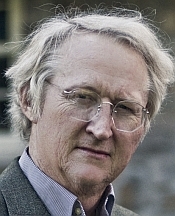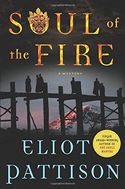
 One of the great gifts I receive as a writer are the messages from readers who say they never truly understood the situation in Tibet or life on the colonial frontier –the settings of my two series—until they read my novels. It highlights an aspect of writing that we too often ignore. Good fiction can, and should, help us understand our world more effectively than nonfiction. Historians deal with sterile facts, on a macro, societal level—and our collective understanding of history slips lower every year. Skilled novelists translate those facts into personal human experience, providing the reader with an opportunity to viscerally connect with another time and place. Your mind may grasp the dreadful statistics of China’s occupation of Tibet but if you truly want to understand that world, your heart needs to grasp the anguish of the gentle lama who is tormented for sitting at an altar with his Buddha. You can find plenty of timelines and bodycounts reflecting life in the American colonies but they pale beside experiencing the power of an Iroquois shaman through the eyes of an exiled Scot sitting at his campfire. “Fiction,” Emerson wrote, “reveals truth that reality obscures.”
One of the great gifts I receive as a writer are the messages from readers who say they never truly understood the situation in Tibet or life on the colonial frontier –the settings of my two series—until they read my novels. It highlights an aspect of writing that we too often ignore. Good fiction can, and should, help us understand our world more effectively than nonfiction. Historians deal with sterile facts, on a macro, societal level—and our collective understanding of history slips lower every year. Skilled novelists translate those facts into personal human experience, providing the reader with an opportunity to viscerally connect with another time and place. Your mind may grasp the dreadful statistics of China’s occupation of Tibet but if you truly want to understand that world, your heart needs to grasp the anguish of the gentle lama who is tormented for sitting at an altar with his Buddha. You can find plenty of timelines and bodycounts reflecting life in the American colonies but they pale beside experiencing the power of an Iroquois shaman through the eyes of an exiled Scot sitting at his campfire. “Fiction,” Emerson wrote, “reveals truth that reality obscures.”
For those of us who anchor our novels in faraway places or faraway times, telling that truth is a duty we owe our readers. This is a bond that must not be broken. Without authenticity in our backstory, we not only lose readers, we damage the genre. I work as hard at keeping my background true to fact as I do at building intrigue in my characters. But it is never simply a matter of fact-checking. Mastering the facts is only the beginning. Much more arduous, and even painful, is deciding what not to write, what not to use directly. Writers who invest long hours in research too often succumb to the temptation to use it all.
The hardest work comes in accurately weaving the backstory into the fabric of my plots and implanting it in the DNA of my characters. One of the tools I use for this is building a private history for each of my characters; there are elements of my characters’ lives that never appear directly on the pages of my books—only I know those detailed biographies, the “facts” of these fictional lives, but they help me breathe life into the players on my stage. If I succeed, then when readers wrap themselves around my characters they are also wrapping themselves around the backstory, accepting my invitation to be transported to that very different world. Novelists who take on this challenge have to distill the essence of their chosen time and place then let it seep and concentrate into the story in a thousand subtle ways. This is what Hemingway meant when he said “all good books are truer than if they really happened.”
About SOUL OF THE FIRE
When Shan Tao Yun and his old friend Lokesh are abruptly dragged away by Public Security, he is convinced that their secret, often illegal, support of struggling Tibetans has brought their final ruin. But his fear turns to confusion as he discovers he has been chosen to fill a vacancy on a special international commission investigating Tibetan suicides.
Soon he finds that his predecessor was murdered, and when a monk sets himself on fire in front of the commissioners he realizes that the Commission is being used as a tool to whitewash Tibet’s self-immolation protests as acts of crime and terrorism. Shan faces an impossible dilemma when the Public Security officer who runs the Commission, Major Ren, orders the imprisoned Lokesh beaten to coerce Shan into following Beijing’s script for the Commission.
He has no choice but to become part of the hated machine that is devouring Tibet, but when he discovers that the most recent immolation was actually another murder, he realizes the Commission itself is riddled with crime and intrigue.
Everywhere he turns, Shan finds new secrets that seem to lead to the last agonizing chapter of his life. Shan must make a final desperate effort to uncover the Commission’s terrible secrets whose painful truth could change Shan’s life – and possibly that of many Tibetans – forever.
About Eliot Pattison
Edgar Award winning Eliot Pattison has been described as a “writer of faraway mysteries,” a label which is particularly apt for someone whose travel and interests span a million miles of global trekking, visiting every continent but Antarctica. An international lawyer by training, Pattison first combined his deep concerns for the people of Tibet with his interest in fiction writing in THE SKULL MANTRA, which launched the popular Inspector Shan series. Pattison’s fascination with the 18th century American wilderness and its woodland Indians led to the launch of his second critically acclaimed Bone Rattler series. ASHES OF THE EARTH marked the launch of his third series, set in post-apocalyptic America. A former resident of Boston and Washington, Pattison resides on an 18th century farm in Pennsylvania with his wife, three children, and an ever-expanding menagerie of animals.


No Comments
Comments are closed.